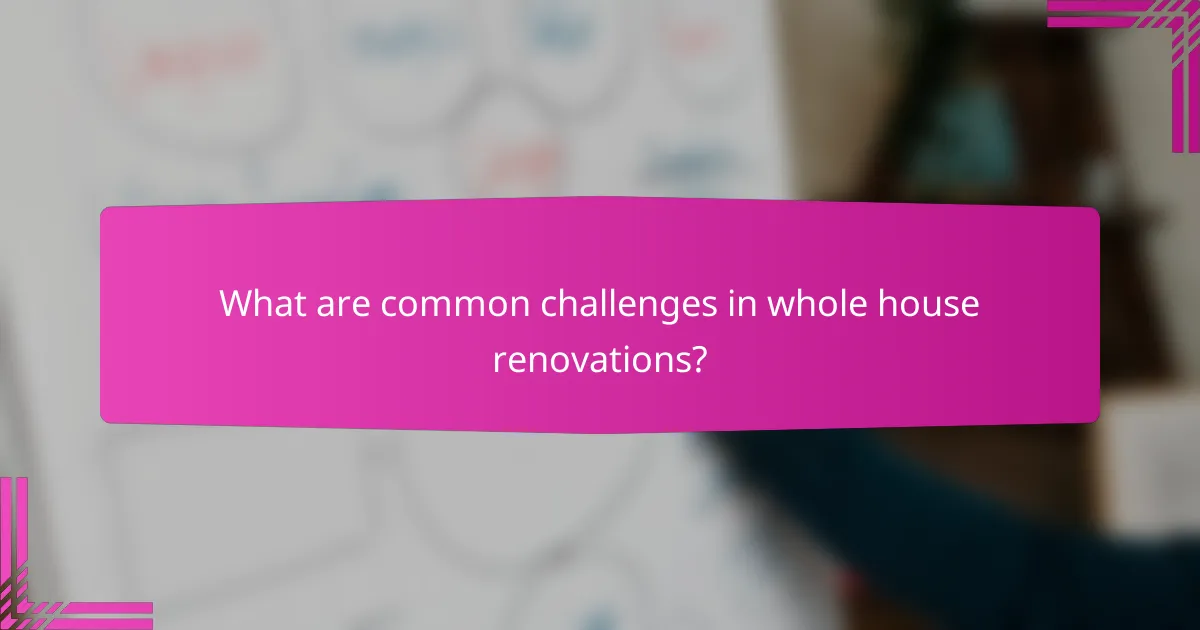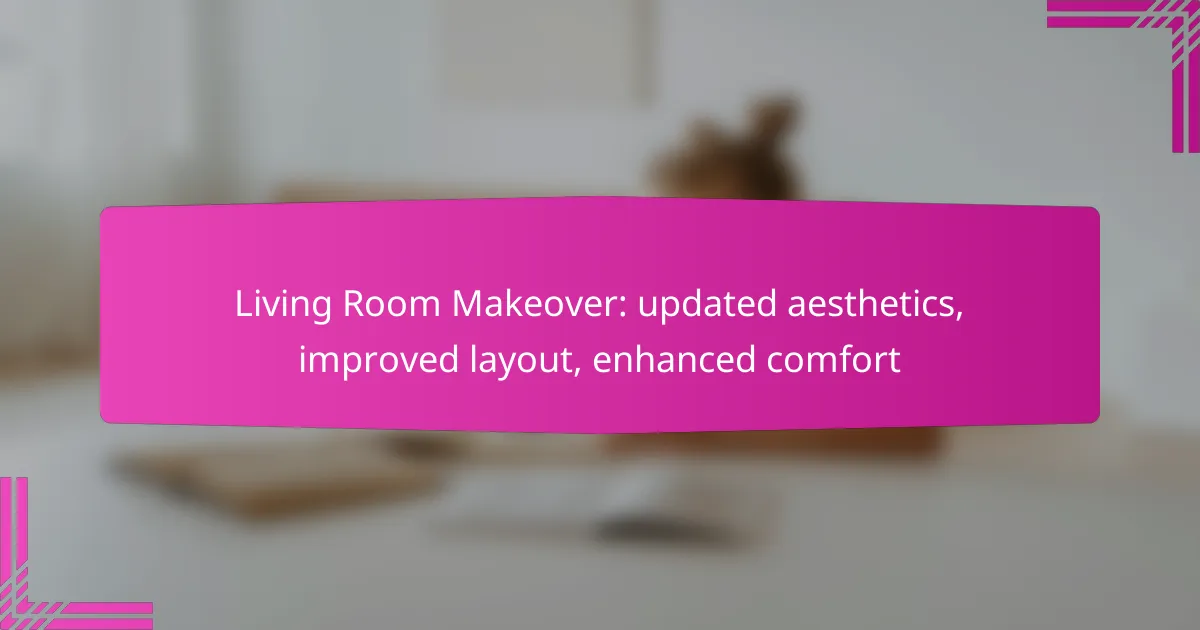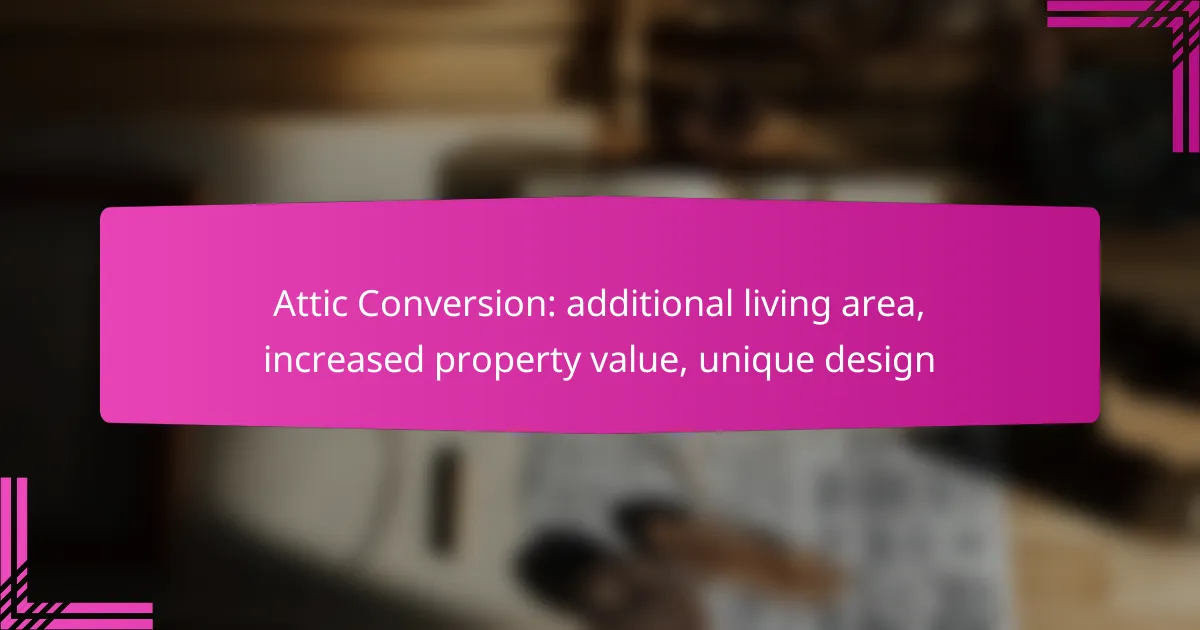A whole house renovation transforms your living space by incorporating modern amenities and enhancing overall comfort. This comprehensive update not only increases property value but also improves energy efficiency, making your home more enjoyable and sustainable. With careful planning and professional guidance, you can create a contemporary environment that meets your lifestyle needs and preferences.

What are the benefits of whole house renovation?
A whole house renovation offers numerous advantages, including increased property value, enhanced energy efficiency, and improved comfort. By updating an entire home, homeowners can create a modern living space that meets current standards and preferences.
Increased property value
One of the primary benefits of a whole house renovation is the potential for increased property value. Renovated homes often attract higher offers in the real estate market, especially if they feature modern amenities and updated designs.
Investing in key areas such as kitchens and bathrooms can yield significant returns, often recouping a substantial percentage of renovation costs. Homeowners should consider local market trends to identify which improvements will maximize their investment.
Enhanced energy efficiency
Whole house renovations typically include upgrades that improve energy efficiency, such as better insulation, energy-efficient windows, and modern HVAC systems. These updates can lead to lower utility bills and a reduced carbon footprint.
Homeowners may also benefit from local incentives or rebates for energy-efficient upgrades, making it financially advantageous to incorporate these features during a renovation. It’s essential to consult with professionals to ensure compliance with local energy standards.
Improved comfort and aesthetics
A comprehensive renovation enhances both comfort and aesthetics, creating a more enjoyable living environment. Upgrades can include open floor plans, modern finishes, and improved lighting, all contributing to a welcoming atmosphere.
When planning a renovation, consider how changes will affect daily life. For example, adding more natural light or creating functional spaces can significantly enhance comfort. Prioritizing personal style while ensuring practicality will lead to a satisfying outcome.

How to plan a whole house renovation?
Planning a whole house renovation involves careful consideration of budget, timeline, and professional help. A successful renovation requires a clear strategy to ensure that updates enhance modern amenities and increase comfort throughout the home.
Set a realistic budget
Establishing a realistic budget is crucial for a whole house renovation. Consider costs for materials, labor, permits, and unexpected expenses, which can often arise. A typical budget might range from 10% to 20% of the total project cost for contingencies.
To create an effective budget, list all anticipated expenses and prioritize them. For example, structural changes may take precedence over cosmetic updates. Utilize online calculators or consult with professionals to gain a clearer understanding of potential costs.
Create a timeline
A well-defined timeline helps keep the renovation on track and minimizes disruptions. Start by outlining key phases of the project, such as design, demolition, and construction, and estimate the duration for each phase. A comprehensive timeline can span several months to over a year, depending on the project’s complexity.
Be flexible with your timeline to accommodate delays, which are common in renovations. Regularly review progress and adjust deadlines as necessary to ensure the project remains manageable and on schedule.
Hire qualified professionals
Hiring qualified professionals is essential for a successful whole house renovation. Look for licensed contractors, architects, and designers with experience in similar projects. Check references and reviews to ensure they have a solid reputation.
Consider obtaining multiple quotes to compare services and pricing. Ensure that all professionals understand your vision and budget constraints. Clear communication from the start will help align expectations and reduce the risk of costly misunderstandings later in the project.

What modern amenities can be included?
Modern amenities in a whole house renovation can significantly enhance comfort and convenience. Key features often include smart home technology, energy-efficient appliances, and open floor plans, all of which contribute to a more enjoyable living experience.
Smart home technology
Smart home technology integrates devices that can be controlled remotely, enhancing convenience and security. Common features include smart thermostats, lighting systems, and security cameras, which can be managed via smartphones or voice assistants.
When considering smart technology, prioritize compatibility with existing systems and ease of use. Look for devices that can be easily integrated into a centralized hub for seamless control.
Energy-efficient appliances
Energy-efficient appliances are designed to consume less energy while providing the same level of performance. These appliances often bear Energy Star ratings, indicating they meet strict efficiency guidelines.
Upgrading to energy-efficient models can lead to significant savings on utility bills, often reducing consumption by 10-50%. When selecting appliances, consider the long-term savings versus the initial investment to determine the best options for your budget.
Open floor plans
Open floor plans eliminate barriers between living spaces, creating a more spacious and inviting environment. This design trend encourages interaction and allows for better natural light flow throughout the home.
While open layouts can enhance socialization, they may also require careful planning regarding furniture placement and acoustics. Consider incorporating multi-functional furniture to maximize space and maintain a cohesive look in your renovated home.

What are common challenges in whole house renovations?
Whole house renovations often come with several challenges that can impact the overall success of the project. Key issues include unexpected costs, delays in the project timeline, and difficulties in finding skilled labor.
Unexpected costs
Unexpected costs are a frequent challenge during whole house renovations, often arising from hidden issues like structural damage or outdated electrical systems. Homeowners should budget an additional 10-20% of the total renovation cost to cover these surprises.
To mitigate the risk of unexpected expenses, conduct a thorough inspection before starting the project. Engaging a professional inspector can help identify potential problems early, allowing for more accurate budgeting and planning.
Delays in project timeline
Delays in the project timeline can occur due to various factors, such as permitting issues, weather conditions, or supply chain disruptions. It’s common for renovations to take longer than initially planned, sometimes extending by weeks or even months.
To minimize delays, create a realistic timeline that includes buffer periods for unforeseen circumstances. Regular communication with contractors and suppliers can also help keep the project on track and address any issues as they arise.
Finding skilled labor
Finding skilled labor can be a significant hurdle in whole house renovations, especially in areas with high demand for construction services. Homeowners may struggle to secure qualified professionals, leading to potential compromises in quality and timelines.
To improve your chances of finding skilled labor, start your search early and consider multiple sources, such as local trade schools, online job boards, and recommendations from friends or family. Always check references and past work to ensure you hire reliable and experienced contractors.

What are the costs associated with whole house renovation?
The costs of a whole house renovation can vary significantly based on factors like location, scope of work, and materials used. Generally, homeowners should budget for a comprehensive range of expenses, which can include labor, permits, and finishes.
Average renovation costs per square foot
On average, whole house renovations can range from around $100 to $300 per square foot, depending on the complexity of the project and the quality of materials chosen. For instance, a basic renovation may cost closer to the lower end, while high-end finishes and extensive structural changes can push costs toward the upper end.
In urban areas or regions with a high cost of living, these figures may increase. It’s essential to obtain multiple estimates from contractors to understand the specific costs in your area.
Cost breakdown by renovation type
The costs associated with different types of renovations can vary widely. For example, kitchen remodels typically range from $15,000 to $50,000, while bathroom renovations may cost between $5,000 and $25,000. Structural changes, such as adding a room or finishing a basement, can significantly increase overall expenses.
It’s crucial to prioritize renovations based on your budget and the potential return on investment. Focus on areas that enhance functionality and appeal, as these can provide better value when selling the home.
Financing options for renovations
Homeowners have several financing options for funding a whole house renovation. Common choices include home equity loans, personal loans, and cash-out refinancing. Each option has its pros and cons, so it’s important to evaluate which fits your financial situation best.
Additionally, some homeowners may consider government-backed loans or grants for energy-efficient upgrades. Researching local programs can uncover opportunities for financial assistance that may help offset renovation costs.

How to choose the right contractor?
Choosing the right contractor for a whole house renovation is crucial for achieving your desired results. Focus on their qualifications, experience, and past performance to ensure a successful project.
Check credentials and reviews
Start by verifying the contractor’s credentials, including licenses, insurance, and certifications. In many regions, contractors must have specific licenses to operate legally, so ensure they meet local regulations.
Next, read reviews and testimonials from previous clients. Websites like Yelp or Angie’s List can provide insights into the contractor’s reliability and quality of work. Look for patterns in feedback to gauge overall satisfaction.
Request detailed quotes
Obtain detailed quotes from multiple contractors to compare pricing and services. A comprehensive quote should outline labor costs, materials, timelines, and any potential additional expenses.
Be cautious of quotes that seem significantly lower than others; they may indicate hidden costs or subpar materials. Ensure each quote is based on the same project specifications for an accurate comparison.
Evaluate past projects
Review the contractor’s portfolio of past projects to assess their style and quality of work. Look for renovations similar to your own to see how they handled challenges and incorporated modern amenities.
If possible, visit completed projects or ask for references to speak directly with former clients. This firsthand feedback can provide valuable insights into the contractor’s work ethic and reliability.



